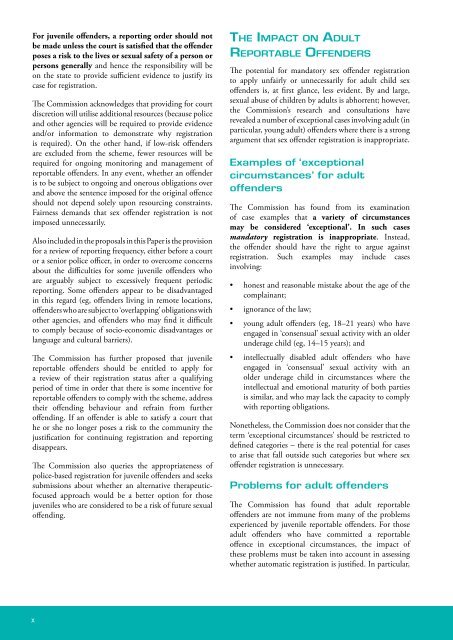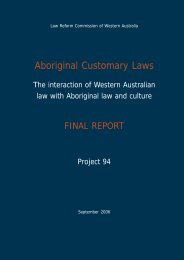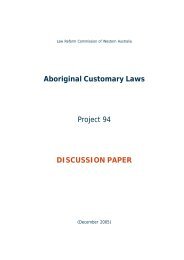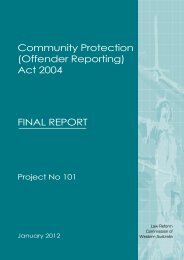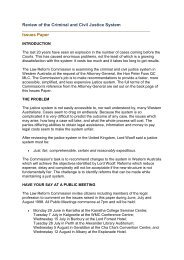Discussion Paper - Law Reform Commission of Western Australia
Discussion Paper - Law Reform Commission of Western Australia
Discussion Paper - Law Reform Commission of Western Australia
Create successful ePaper yourself
Turn your PDF publications into a flip-book with our unique Google optimized e-Paper software.
For juvenile <strong>of</strong>fenders, a reporting order should notbe made unless the court is satisfied that the <strong>of</strong>fenderposes a risk to the lives or sexual safety <strong>of</strong> a person orpersons generally and hence the responsibility will beon the state to provide sufficient evidence to justify itscase for registration.The <strong>Commission</strong> acknowledges that providing for courtdiscretion will utilise additional resources (because policeand other agencies will be required to provide evidenceand/or information to demonstrate why registrationis required). On the other hand, if low-risk <strong>of</strong>fendersare excluded from the scheme, fewer resources will berequired for ongoing monitoring and management <strong>of</strong>reportable <strong>of</strong>fenders. In any event, whether an <strong>of</strong>fenderis to be subject to ongoing and onerous obligations overand above the sentence imposed for the original <strong>of</strong>fenceshould not depend solely upon resourcing constraints.Fairness demands that sex <strong>of</strong>fender registration is notimposed unnecessarily.Also included in the proposals in this <strong>Paper</strong> is the provisionfor a review <strong>of</strong> reporting frequency, either before a courtor a senior police <strong>of</strong>ficer, in order to overcome concernsabout the difficulties for some juvenile <strong>of</strong>fenders whoare arguably subject to excessively frequent periodicreporting. Some <strong>of</strong>fenders appear to be disadvantagedin this regard (eg, <strong>of</strong>fenders living in remote locations,<strong>of</strong>fenders who are subject to ‘overlapping’ obligations withother agencies, and <strong>of</strong>fenders who may find it difficultto comply because <strong>of</strong> socio-economic disadvantages orlanguage and cultural barriers).The <strong>Commission</strong> has further proposed that juvenilereportable <strong>of</strong>fenders should be entitled to apply fora review <strong>of</strong> their registration status after a qualifyingperiod <strong>of</strong> time in order that there is some incentive forreportable <strong>of</strong>fenders to comply with the scheme, addresstheir <strong>of</strong>fending behaviour and refrain from further<strong>of</strong>fending. If an <strong>of</strong>fender is able to satisfy a court thathe or she no longer poses a risk to the community thejustification for continuing registration and reportingdisappears.The <strong>Commission</strong> also queries the appropriateness <strong>of</strong>police-based registration for juvenile <strong>of</strong>fenders and seekssubmissions about whether an alternative therapeuticfocusedapproach would be a better option for thosejuveniles who are considered to be a risk <strong>of</strong> future sexual<strong>of</strong>fending.Th e Im p a c t o n Ad u l tRe p o r t a b l e OffendersThe potential for mandatory sex <strong>of</strong>fender registrationto apply unfairly or unnecessarily for adult child sex<strong>of</strong>fenders is, at first glance, less evident. By and large,sexual abuse <strong>of</strong> children by adults is abhorrent; however,the <strong>Commission</strong>’s research and consultations haverevealed a number <strong>of</strong> exceptional cases involving adult (inparticular, young adult) <strong>of</strong>fenders where there is a strongargument that sex <strong>of</strong>fender registration is inappropriate.Examples <strong>of</strong> ‘exceptionalcircumstances’ for adult<strong>of</strong>fendersThe <strong>Commission</strong> has found from its examination<strong>of</strong> case examples that a variety <strong>of</strong> circumstancesmay be considered ‘exceptional’. In such casesmandatory registration is inappropriate. Instead,the <strong>of</strong>fender should have the right to argue againstregistration. Such examples may include casesinvolving:• honest and reasonable mistake about the age <strong>of</strong> thecomplainant;• ignorance <strong>of</strong> the law;• young adult <strong>of</strong>fenders (eg, 18–21 years) who haveengaged in ‘consensual’ sexual activity with an olderunderage child (eg, 14–15 years); and• intellectually disabled adult <strong>of</strong>fenders who haveengaged in ‘consensual’ sexual activity with anolder underage child in circumstances where theintellectual and emotional maturity <strong>of</strong> both partiesis similar, and who may lack the capacity to complywith reporting obligations.Nonetheless, the <strong>Commission</strong> does not consider that theterm ‘exceptional circumstances’ should be restricted todefined categories – there is the real potential for casesto arise that fall outside such categories but where sex<strong>of</strong>fender registration is unnecessary.Problems for adult <strong>of</strong>fendersThe <strong>Commission</strong> has found that adult reportable<strong>of</strong>fenders are not immune from many <strong>of</strong> the problemsexperienced by juvenile reportable <strong>of</strong>fenders. For thoseadult <strong>of</strong>fenders who have committed a reportable<strong>of</strong>fence in exceptional circumstances, the impact <strong>of</strong>these problems must be taken into account in assessingwhether automatic registration is justified. In particular,x


